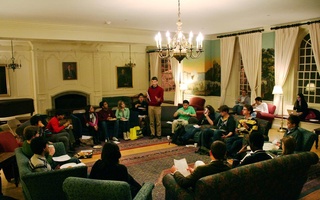I am a junior at Stanford University and an officer of Stanford Students for Queer Liberation. I am frustrated and appalled by the rhetoric displayed in The Crimson’s Staff editorial “The Return of ROTC” published on January 31. As an advocate for civil rights, our organization is working against ROTC’s return to Stanford and against President Obama’s rallying cry for reinstituting the program across the nation.
The Crimson Staff first lauds the repeal of DADT and uses the now ostensible openness of the military as justification for ROTC’s return. In almost the same breath, The Staff points out the continued military exclusion of transgender and intersex people (though actually using the disparaging term "transgendered"), and then declares that this de jure discrimination should not be sufficient grounds for keeping ROTC away. To me, this is a huge logical hole. If discrimination against lesbian, gay, and bisexual servicemembers was a barrier, explicit exclusion of another identity group protected by Harvard and Stanford’s own respective non-discrimination policies should also be a barrier. Along those lines, if the excluded group were a racial minority, would this discourse be as defiantly pro-ROTC?
The Staff posits that the trans/intersex discrimination issue was not discussed until after DADT was repealed. No doubt, mainstream LGB (not T) organizations have been uncritically excluding transgender politics from the public discourse on DADT, but the National Center for Transgender Equality and other queer and transgender advocacy groups have been discussing these issues of access and discrimination. We should be questioning our unawareness of the transgender student exclusion issue.
The Staff also theorizes that Harvard failing to bring back ROTC risks a loss of credibility to administrators who promised ROTC would return after DADT. Schools like Harvard and Stanford do indeed have the ability to engage their communities in nuanced, self-critical dialogue. We, at both Harvard and Stanford, recognize that gender identity is more than a token addition to our non-discrimination policies. We can ask administrators to state that they were previously incognizant or unsympathetic to the institutional discrimination against transgender students, but that this argument is a compelling reason to uphold our investments in equal opportunity and oppose ROTC.
I ask that all universities considering ROTC, but especially those like Harvard and Stanford who possess huge cultural capital, issue statements opposing the program in support of their transgender students. Several of us at Stanford are working with queer and transgender advocacy groups like the NCTE, and they have explicitly stated that such statements would indeed have significant positive impact for their work in the area of military discrimination. This is not merely a “queer agenda,” however, but a problem that behooves attention from us all as students opposed to de jure discrimination in favor of civil rights.
Janani Balasubramanian
Palo Alto, Calif.
Jan. 31, 2011
Janani Balasubramanian is a junior at Stanford and an officer within the Stanford Students for Queer Liberation.
Read more in Opinion
LETTER: Veterans Welcome ROTC BackRecommended Articles
-
Keep ROTC Out of RangePromising to reinstate ROTC simply to pressure a repeal of DADT is short-sighted
-
Even Stronger SupportHaving ROTC at Harvard would increase opportunities for those students who choose to join to give back to their country.
-
Continued Discrimination in ROTCThe recent repeal of the U.S. military’s Don’t Ask Don’t Tell (DADT) policy has paved the way for several universities, ...
-
 Harvard Political Union Debates ROTC
Harvard Political Union Debates ROTC -
 Harvard Signs Agreement To Officially Recognize Naval ROTC
Harvard Signs Agreement To Officially Recognize Naval ROTC -
Moving Forward with the MilitaryNow that ROTC is set to become an official presence on campus, the University must take immediate action to ensure that the program and the undergraduates who choose to participate in it can be better incorporated into our community.













